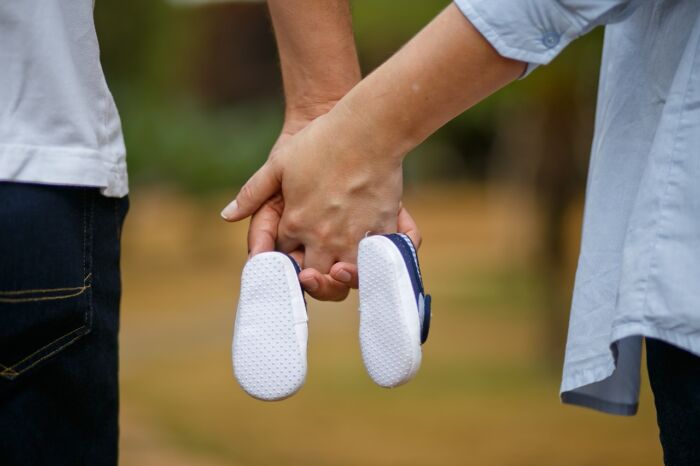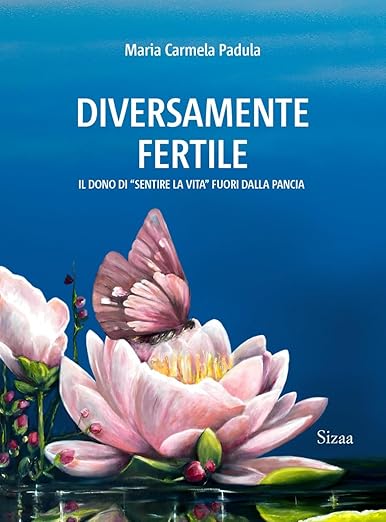
A negative pregnancy test is the beginning of the end. It is a verdict without appeal on a summer morning. There are no nuances, especially when it is not the first one, especially when it is the exact same result despite having changed a lot in the stages leading up to that ‘not pregnant’. It is black and for a moment everything goes black. The three-minute wait for the response seems interminable. That morning I opened my eyes and in an instant realised that urinating upon waking up, an everyday and almost taken for granted action, would have a far different load and implication from the ordinary. As I do every morning, I had implemented the invasion of Francesco’s half of the bed for the usual good morning hug, but, limiting the time devoted to that moment, I told him: ‘Let’s go, bladder calling. Let’s see if anyone is there or not’. And he, lifting the sheet: ‘Let’s go, love’ and, in a moment, there he was, unwrapping the device.
While the sensor worked to give an affirmative or negative answer, there was a couple trying to distract themselves by making coffee and setting the table for breakfast, a moment all our own and the only one we experienced without racing with each other’s shared planning of the day. Our stomachs were tight, but we were both trying to behave in a natural and usual way. The three minutes had passed and, returning to the bathroom, a couple who had just realised the end of their parenting dream appeared before our eyes, and that couple was us. Also in that bathroom was a woman who had realised that embryo had chosen to leave. That woman was me. My embryo had chosen not to be with me, it had gone away, quietly, I didn’t know when and I didn’t know why.
My scientific mind knew that even though we worked on all possible fronts, even though we relied on wonderful people and professionals, there are the gaps or biases of the ‘unknown’, of the uncontrollable. You cannot modulate everything with medicine. From the transfer onwards, there is a knowledge gap, there is medicalisation, but there is no monitoring, there is only waiting, a waiting that, when it ceases to be such, can put one in the position of surrendering or directing one towards a new waiting. My non-scientific mind, the one
based in the (empty) belly, projected before my eyes its carousel of shadows: doubts about not having slowed down the pace, doubts even about my inadequacy in the role of mother, doubts that I decided too late and thought too much about something else, doubts that my embryo had made the right choice and was presenting me with the bill for my errors of judgement and previous life choices.
In the meantime, rationality was doing its job of trying to lighten the black by adding a few drops of white, and here I was, prepared for the possibility of that result, beginning to repeat to myself: ‘Don’t look for the why of what is materialising before your eyes and in your heart, while the idea that you might join the club of pregnant women first and mothers later is dematerialising inside you’.
In the meantime, there was the ‘here and now’, there was my husband and, after the response, I found myself in his arms listening to words full of meaning, whispered with pain in my heart: ‘For me there is you and you are my everything’. It is mutual and it is beautiful: it is not taken for granted to experience a long and impactful IVF journey without deviations from the balance within the couple. We were immersed in a destabilising situation, but we managed to stabilise the us. Merit of love certainly, merit of the same love that one wishes to complete, as a couple, by entrusting oneself to that little embryo.
But that embryo was gone, and still, no one knows when and no one knows why. The only certainty is that it wasn’t there, the device thundered ‘not pregnant’. To that morning, the one when the first pee of the day has the potential to change more than a couple’s day, one arrives with a load of emotions and drugs in one’s system.
Until the pregnancy test one is expecting, but the anticipation of the eventual sweet expectation was anything but sweet. That embryo had been transferred inside me, it had to take root, dig in, ‘feed on me’, implant itself. The mother-foetus interface is incredible from a biological point of view: how many mechanisms have to take place, how many molecules in action, how many cells, how many signals, how much energy is needed. And it is as if that energy is trying to send it with all my positivity. I wondered how cosy my environment was and, as the days went by between my beloved work and my pleasant everyday life, I would find myself in bed at night with a hand on my belly wondering if that embryo was still there and how hard life could be there, asking it to endure even if it is hard, because life is hard but it is beautiful.
I almost felt like Fallaci not writing to an unborn child, but addressing an embryo that she would soon discover was an embryo that had never been implanted. Negative test, confirmed in a few hours by the beta-HCG hormone assay. Zero, nothing. The numbers come back and that zero confirms that in my body were my cells and there was no trace of that embryo that has half my genetic heritage and half the
my husband’s genetic heritage. Yet that zero, responsible for an unchanged state, would actually have brought many more changes within me than I could have thought as I looked at that number that equals nothing. Zero is also the number that precedes one, the incipit.

The ‘new me’, which was already being constructed, was to be defined every day after the now more than overt entry into the world and mood of the ‘differently fertile’, because of that very zero. Even this is not immediately understood, just as one does not know when the embryo decides to leave. It is also not immediately clear that, even if it is just passing through, it has left something behind. That embryo that was never implanted was merciful to me: it left me the gift of knowing how to make sense of everything, of first processing, and then accepting, the failure of a journey with a smile on my lips, mitigating the pain in my heart. I was aware that life had not given me anything for free, sweating for my small achievements was a constant and I was fine with that because I am certain that I really feel that what I have built from scratch is mine, with the progression of numbers, to which I have always given important booster doses to get to my small goals as quickly as possible.
The extensively tested and applied ‘goal-commitment-effort-perseverance-result’ paradigm, if it comes to my reproductive capacity, did not work, because, of the five elements, the last one was inexorably missing, which was not only the finale in temporal terms, but represented the finale in substantive terms. The goal that does not become the result remains the goal. Commitment and effort prove to be in vain in the face of the negative pregnancy test, the hormone with zero levels and the embryo that silently went away. And that morning, there were Francesco and I, not only with the load of numbers, but we numbers ourselves, prime and uncompounded numbers, divisible only by the other (the one) and by ourselves. Twin prime numbers, those that differ from each other by two, separated by an even number. Separated by our dream, closer than ever. There were Francesco and I without the embryo, with a packed suitcase, prepared the night before, to leave for our summer holiday, booked months before.
‘Whatever happens tomorrow, you and I are each other’s strength and we will face everything, strictly hand in hand,’ my words as we were transferring the clothes and necessities to take with us from the bed to the luggage. Needless to say, we had also put a lot of hope in that suitcase. It was of no use and, in light of the non-result, the next day we had removed it from the suitcase and replaced it with the
promise and willingness to give ourselves some time to relax, a long-awaited time of the year, to let the pain we were experiencing be lulled by the waves of the sea that awaited us and to let the darkness that had descended from the Sicilian sun shine through. A new micro objective in the face of a macro non-achievement.
Taken from “Otherwise fertile. The gift of ‘feeling life’ outside the belly” (original title: “Diversamente fertile. Il dono di ‘sentire la vita’ fuori dalla pancia”), by Maria Carmela Padula, Sizaa Publisher, 2024, ISBN: 978-88-947954-1-7.







































